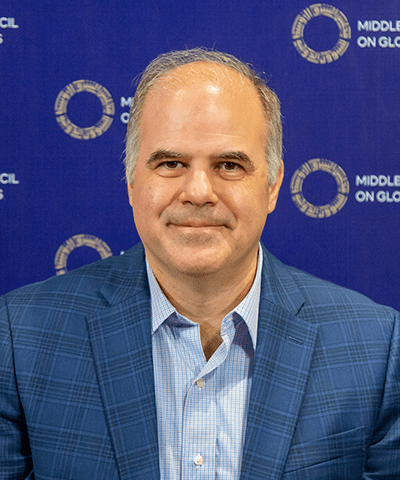Qatar's Role in Global Emissions Mitigation
June 3, 2024
Summary
On 3 June 2024, the Middle East Council on Global Affairs (ME Council) and Qatar Foundation’s Earthna Center for a Sustainable Future (Earthna) convened a roundtable discussion focusing on Qatar’s role in global emissions mitigation. The discussion explored Qatar’s contribution to the reduction of global emissions through the export of liquefied natural gas (LNG) and considered strategies for enhancing its role in the future. The roundtable convened a diverse group of experts who discussed Qatar’s emission challenges and delved into innovative strategies that Qatar could adopt to mitigate emissions locally and globally. Leveraging the collective expertise of the participants, the discussion explored pragmatic solutions that align with Qatar’s National Vision 2030, its socio-economic context, and its environmental imperatives. The roundtable was structured into three sessions, each addressing distinct aspects of Qatar’s emissions mitigation strategies.
Dr. Muez Ali, a senior research and policy associate at Earthna, opened the roundtable with a presentation on the impact of Qatar’s LNG exports on global emissions. Ali presented key findings from a research paper he co-authored, which found that Qatar’s LNG exports made a substantial contribution to the reduction of global emissions between 2005 and 2020. Ali then analyzed the potential future impact of Qatar’s LNG exports, taking into account factors such as the phase-out of coal and global energy consumption trends. He found that LNG exports’ contribution to future emissions reductions are anticipated to decrease due to coal phase-out. This underscored the necessity of Qatar investigating in alternative strategies in order to continue the mitigation of emissions on a global and local scale.
The ensuing discussion acknowledged the significant contributions of LNG exports to global emissions reductions and delved into the challenges posed by shifting global energy dynamics, particularly the continued reliance on coal in some regions. One participant underscored the significance of collaborating with export markets, particularly in Southeast Asia, and recommended ensuring that Qatar’s energy transition strategy is aligned with the changing global trends. Questions arose regarding Qatar’s future strategies to address the evolving climate policies in export markets, which underscored the necessity of adaptable and flexible approaches to emissions mitigation. Participants also emphasized the significance of well-targeted strategies to optimize mitigation’s impact.
During the second session, Dr. Nader Kabbani, senior fellow and director of research at the ME Council, focused on Qatar’s initiatives to reduce emissions and promote sustainable development. He emphasized Qatar’s ambitious objective of reducing greenhouse gas emissions by 25 percent by 2030, discussing the obstacles and opportunities associated with achieving this objective. Kabbani also examined Qatar’s energy price subsidies, with a particular focus on electricity subsidies and their potential impact on emissions reduction. He emphasized the inefficiencies of current system and drew attention to targeted subsidies as a means of promoting energy efficiency and minimizing waste. Kabbani emphasized the governance challenges in subsidy reform and the significance of transparent subsidy mechanisms.
Participants then explored various policy measures to promote emissions reduction in Qatar, such as investing in sustainable technologies. They emphasized the importance of international collaboration and innovative solutions, along with the significance of confronting emissions from sectors such as transportation and construction. Participants also discussed potential avenues for Qatar to contribute to global emissions reduction initiatives while simultaneously balancing domestic priorities. The discussions underscored the significance of aligning domestic strategies with global decarbonization objectives and noted Qatar’s potential as a hub for green technology and sustainability.
In the concluding session, participants discussed the prospective role of research institutes and think tanks in advancing Qatar’s sustainability agenda, with a particular emphasis on their ability to facilitate informed decision-making. They emphasized the importance of ongoing dialogue and collaboration among various stakeholders to advance sustainable development initiatives, stressing the significance of research-based policy recommendations and collaboration between academia, industry, and government.

